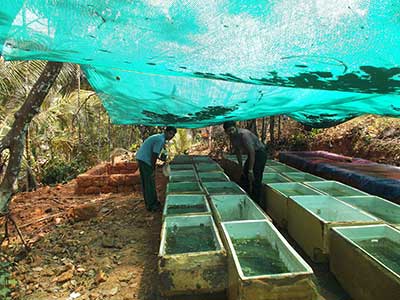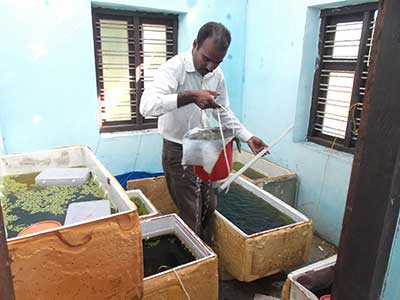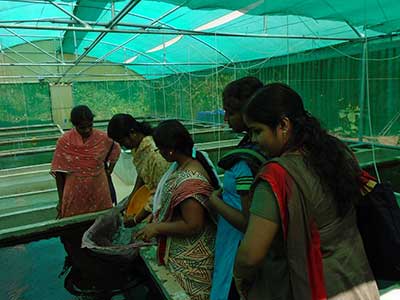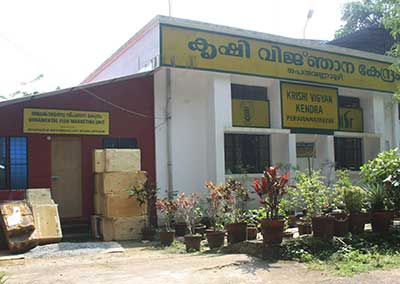
This technique involves production of ornamental fishes in pools holding less than 1000 liter water or in used refrigerator/ fridge containers with 100-200 litre capacity. The pools are setup using used flex or silpaulin, sheets. They are constructed at elevated area or at a higher terrain so as to facilitate water exchange by gravity. At weekly interval 20 % of bottom water is exchanged and this water is used for irrigating plants. This integrated farming approach uses more cops per drop of water. The pools for fish culture can also be erected on roof top of house employing wooden frames or at backyard using bricks/laterite stones.
The technology employs utilization of used fridge boxes which are often thrown as scrape after removal of metal part. The holes in the rigid foam/plastic (poly urethane/ polystyrene) can be easily sealed with adhesives like m-seal or by plastering with cement. Such fridge boxes are ideal for culturing live bearers fishes and for breeding egg laying fishes like gold fishes, small carps, Oscars etc. These containers are as good as fiber tanks which can cost up to Rs.4000 for same dimension. The rigid foam facilitates stacking of boxes one above other thus enabling effective utilization of floor area. The cost of these fridge boxes in scrape market range from Rs.75 to Rs.125. There are specialized scrape dealers who effectively separate the metal part without damaging the inner foam in Kozhikode and sell these containers for culturing fish. On an average Rs.1000 can be earned from these boxes in a year by culturing ornamental fishes. The farmer can anytime sell back the boxes as scrape if any damage occurs, thus getting maximum benefit from it.

Various varieties of freshwater live bearer fishes like guppy (Poecilia reticulate), Platy (Xiphophorus spp.), Molly (Poecilia latipinna) or Swordtail (Xiphophorus helleri), which belong to the family poecillidae are cultured by this method. These small size fishes with less than 10 cm length reach marketable size in four months and give assured income to farmers.
Similarly used flex banners or sheets can be used for culturing ornamental fishes as a backyard activity or on roof top of concrete houses. These can be a replacement for conventional concrete pools. Flex banner and hoardings that are flooding in our society are rarely recycled. They are mostly re-used for roofing purpose and for this only large size sheets are used. These flex sheets meant for roofing are easily available in shops, but the smaller size are often discarded after use. Even these small flex sheets can be used for cultivating aquatic plants used in aquarium and for culturing ornamental fishes. The pools need to be constructed at elevation or at a higher terrain so as to facilitate water exchange by gravity. They should be covered with net to protect the fishes from birds and other predators. Excess algal bloom can be controlled by covering the tanks with shade nets.

Scaling up of technology and its Impact
KVK is regularly giving training (On and Off-campus) on breeding and culture of ornamental fishes and also conducting On Farm Trials (OFT) and Front Line Demonstration (FLD) to Kozhikode, Waynad and Malapuram district farmers of Kerala. During the training programme the trainees are given hands on training on various aspects of ornamental fish culture including the breeding, culture of ornamental fishes, fish feed preparation, aquarium tank, hood construction, water quality, disease management etc.
More than ten thousand trainees including youth, farm women and farmers from various districts of Kerala have undergone this training by KVK and are practicing fish culture. This low investment technology taught to them enables them to start the unit with a minimum investment for Rs.500. Nearly 80% of the trainees have fancied fish culture after attaining training at KVK due to its low investment nature. Mrs. Gracy Joseph, Thadathil puthenpurayil (h) Adivaram P.O Kozhikode had started her unit with the low investment techniques after attaining training from KVK and then she expanded her unit to a hi-tech one. The confidence and profit gained from the low investment venture enabled her to expand the unit with financial assistance from Marine Product Export Development Authority (MPEDA).

Similar was the case with Mr. Benny Thomas from Koorachundu. Many other farmers like Mr. Sumesh, Mr. Deepak Gosh V.M, Mr. Sajith Kumar K.T and Mr. Rajeesh K of Kozhikode district have established their units in this manner and have become successful entrepreneurs. In continuation, KVK with the funding support from Department of Biotechnology, Government of India has empowered 25 rural women in the district by providing them a sustainable livelihood through ornamental fish culture adopting the low investment culture techniques. Two women self help groups (Angel JLG (Reg. No.24/16-17/PBA and Jaya activity group Reg. No. 110/708/01/164) have been formed under the project and these women have been marketing their produce through the sales counter at KVK. They are also involved in preparing and selling fish feed. The women have been earning a monthly income of Rs.2000-5000 from this part time activity. After seeing the technology a NGO Integrated Development Centre (IDC) Thamaraserry has set up 250 JLG units in the district with the technical backup from KVK and funding support of NABARD. KVK also been setup an ornamental fish sales unit with the facilities of aquariums to stock their fish and fish feed preparation facility at KVK campus itself for the benefit of ornamental fish entrepreneurs.
